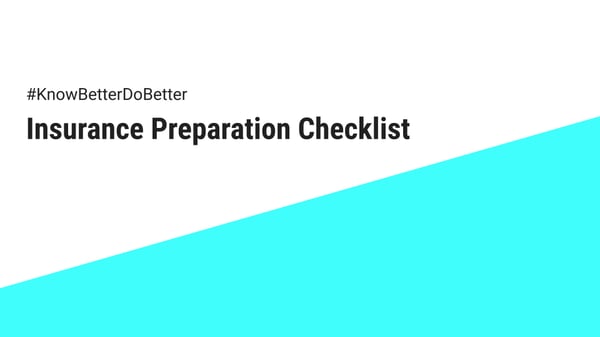Protecting Against Risk: What is Insurance and Why Do Artists Need It?
What is risk?
Risk is uncertainty and a chance of loss. Everyone faces risk. There are everyday risks -- when you drive a car, when you’re unsure if you’ve left the stove on, if you leave your camera on the train — and then there are those risks that you encounter when making art — when you produce a play and deadlines are missed, transfer a painting and knock into a wall, throw a fundraiser and a volunteer gets food poisoning, teach a class and a student slips and falls, the list goes on.. You can try to protect yourself against risk in several ways:
- Avoid the risk -- by not undertaking the risky activity at all
- Reduce the risk -- by having back-up equipment, inventory, security, or systems
- Share the risk -- by communicating with collaborators and requesting risk waivers
- Transfer the risk -- by purchasing insurance that pays when you suffer a loss
What is insurance?
Insurance can protect you from the risk of financial loss. You buy insurance to manage unanticipated risk of harm to your stuff, your space, and your people. Although not all harm is financial (we know harm can be emotional and physical too), a legally-binding insurance contract translates the harm into a dollar amount that gets paid if you can prove that the loss happened, that your insurance policy covered that type of loss, and you can attach a dollar-value to the loss.
Basic terms to know:
Agent
The person or organization that helps you find the insurance you need, and who works for a specific insurance company (e.g., State Farm insurance agents)
Broker
The person or organization that helps you find the insurance you need, and who are permitted by many different insurance companies to sell insurance
Insurance company or Insurer
The company paying out on the claim
Policy
The legal contract that includes what’s covered and for how much
Claim
The formal request by an insurance policyholder to an insurance company asking for coverage or compensation.
Note: just because you file a claim under your insurance policy, does not mean you will automatically receive money. Each policy has unique requirements that you must meet during the claims process before you receive payment.Why is insurance important?
Insurance is important because you (and/or your company, employees, or volunteers) might not have enough money in your bank account to pay for any harm that might come to your stuff, your space, and your people. Whether it’s fire, flood, famine, pestilence, or anything in between, trying to rebuild yourself or someone else from scratch is expensive. Insurance can help.
Note that insurance is typically not a windfall -- it will only put you back to where you were at the time of loss. In other words, if one year goes by between the event that caused the loss, and the ultimate insurance payment, that insurance payment will take into consideration the items covered under your policy as of the date of the event -- not what else happened after the event (even if it feels like it should all be connected).
Who needs insurance?
If you live and create in the United States, you probably need insurance because there are not a lot of safety nets that will pay you money if you suffer financial or physical harm. Insurance can be complicated -- there are many types of insurance: disability, general liability, health, homeowner’s/renter’s, premises/space, property/equipment, supplies, touring, volunteer, workers’ compensation -- the list goes on. Do you need all of it? Probably not. But, many people and organizations with whom you partner as an artist will require you to have some type of insurance coverage. You may also want insurance for your peace of mind.
Here are a few examples of when insurance coverage might kick in:
- At dress rehearsal, a theatre set falls on one of your volunteers and injures them.
- On location at a photoshoot, someone steals your camera bag.
- At your art gallery opening, a guest slips, falls, and breaks their arm.
- Your public art display falls over and damages the building next door.
- On an international symphony tour, the tour bus gets into an accident and your instruments are damaged.
- While checking out your home studio or home office, your friend accidentally spills coffee onto your raw materials and tools.
- While setting up your space for an art show at the local coffee shop, you damage the walls and break a window.
When should I start thinking about insurance?
Think about insurance right away. If you have equipment, work in your own space, and/or ever have people help you out, you need to protect them. Even if you work with someone else’s equipment, at their site, and with their people, it is unlikely that someone else’s policy will cover you and/or your creative work. Insurance may not be required, but it is a great thing to have: a $500 investment now is much easier on the budget than a $50,000 claim later!
What are the things I should prepare/consider before I start shopping for insurance?
Below are some things to consider as you plan to buy insurance. You can download this section as a useful checklist here.
Identify why you want insurance.
Is your venue requiring you to show proof of insurance for your equipment and supplies? Is your landlord suggesting you need renter’s insurance? Are your best friends helping you set up your public art installation, and you want to protect them from injury? You may be required to have some sort of insurance by a venue, or you may just want insurance for peace of mind. Either reason (or both) is legitimate.
Describe what/whom you want to protect.
Are you trying to protect your stuff, your space, or your people? The answer can be one or more of these things.
Understand how much insurance you might need.
If you want to protect your stuff, you need to know how much it costs to replace it. Start researching and saving web pages and/or taking notes. Soon, you’ll have a list of your artistic equipment needs with replacement prices, and you’ll be ready to have a detailed discussion with an insurance broker about what policy limits you might need.
If you want to protect your space, try to understand the size of your space, how you access the space, how many people can safely be there at the same time, and how old it is. (Is it a fifth floor 500 square-foot apartment? A public garden? A treehouse with a rope ladder? A historic office building without overhead sprinklers -- and your theatre show has a fire component?)
If you want to protect your people, write down how many people you think you might need (whether volunteers, employees, independent contractors, or a combination), and what they’ll be doing. If they’ll be climbing ladders and scaffolding to put up lights, that’s riskier and may require a different type of insurance than people setting up tables and chairs.
Know when/for what time period you need insurance.
Are you seeking insurance for a special, three-day event, or do you need long-term insurance on your painting studio? Do you need volunteer insurance for dress rehearsals and public readings, or do you have employees that need ongoing protection? The time period is important because your insurance will only provide coverage during the effective dates of the policy.
If you’re already familiar with insurance products and your needs, list out the coverage that you might want.
There are many, many types of insurance. In our experience, artists most often need one or more of the following insurance products: Business Owner, Director & Officer, General Liability, Volunteer Accident (medical coverage), Inland Marine (equipment and supply coverage), Professional Liability (errors and omissions coverage), Special Events, or Worker's Compensation (medical and wage coverage for employees).
Bottom Line on Insurance
Insurance can pay you if your stuff, your space, or your people are damaged or injured because of an accident, theft, fire, flood, or anything in between. Insurance can be complex and expensive. If you’ve considered why you need insurance, what you want to protect, and when, you’ll be more prepared for the conversation with a broker.
Next Steps in Getting Insurance
Contact your local insurance agent and check out the Additional Resources below to contact one of the national brokers and agents who have artists and non-profits in mind. You can also research online, with sometimes overwhelming results. To separate the wheat from the chaff, refine your search results with these questions in mind:
- Does the insurance agent or broker offer a program for artists and creatives? Filmmakers, photographers, painters, and writers may have different insurance needs than the general public — and you want your agent or broker to understand those differences.
- Is the insurance agent or broker national, regional, or local? A public art installation may require a detailed understanding of local zoning laws, whereas a traveling theatre company may need a national company who understands multiple markets.
- If you know what insurance you need, does the agent or broker offer the product you seek? Not all companies offer all products.
- Does the agent or broker conduct business in a way that aligns with your values? Occasionally, agents and brokers are Certified B Corps, have corporate social responsibility (CSR) programs, support business diversity initiatives and anti-oppression principles, or partner with philanthropic and socially-minded businesses.
- Is the agent or broker willing to provide references from customers with similar needs? It doesn’t hurt to check a reference or two.
Additional Resources:
About Keka Sircar
Keka is a business advisor and lawyer. As Fractured Atlas’s Senior Director of Program Strategy, she strives to enhance existing programs and discover new offerings for artists from all specializations. She earned her Bachelor of Arts in psychology from the University of Michigan in her hometown of Ann Arbor (Go Blue!), her Juris Doctor from the Indiana University Maurer School of Law, and her Master in Business Administration from the Indiana University Kelley School of Business. Keka has an insatiable curiosity about the world around her, and loves all creatures great and small, live music of all kinds, the power of yoga, and everything about food.
.jpg)


.jpg?width=600&name=woman-playing-chess-2283803%20(1).jpg)
